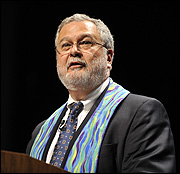Everything changes
Central to our faith tradition is our willingness to leave behind what no longer serves us.
At one level, of course, anniversaries are completely arbitrary. Why not make a big deal of forty-nine years, or fifty-one? While arbitrary, these major anniversaries give us an opportunity to honor those whose vision and labor created and sustained our religious movement. Perhaps more important, this anniversary provides us with an opportunity to reflect on the next fifty years. The next fifty years will probably bring far more change than the last fifty.
I can only imagine the endless meetings and negotiations that were necessary to bring the Universalist and Unitarian organizations together. None of these people could have foreseen our world of cell phones, instant messaging, nationwide conference calls, video conferencing, blogs, websites, and social media. Fifty years ago no one was talking about the massive cultural and ethnic changes brought on by immigration from Latin America and Asia.
Everything changes. This is a fundamental truth of life and a central spiritual lesson. Yet it is a lesson we all resist learning. I find myself trying to keep things the same, to freeze time. We cause ourselves so much suffering when we resist the passage of time, when we try to hold on to a past that is gone. Resisting change brings suffering. Embracing possibilities together brings joy, meaning, and fulfillment.
What is true of an individual is true for a congregation and for our religious association. When I served as a parish minister I often joked that as soon as I figured out what I needed to do to be a better minister my congregation would change. I lamented, only half in jest, that I had to figure out how to serve a new congregation every couple of years. I have seen too many congregations try to hold on to a past that is gone forever. The result is spiritual implosion and organizational decline.
As I look back on our history and look ahead to our future, I see how our past can be either a springboard or a prison. Our history can trap us or inspire us to set out in new directions. The critical thing, and it is absolutely critical for Unitarian Universalism today, is what use we make of our past.
The Unitarianism of William Ellery Channing and the Universalism of Hosea Ballou are gone forever. Everything changes. Indeed, the Unitarianism and Universalism of 1961 are gone. We live in a very different world. The fastest growing religious group in America today is people who practice no religion. The worship and the programs that worked fifty years ago will not work tomorrow.
Our past, especially our past success, can be a trap. Yet there is another part of our religious heritage that is the core of our spirituality and a reliable guide for our future: What is central to our faith tradition is our willingness to leave behind what no longer serves us and to embrace the possibilities of today and the promise of tomorrow.
This is what all of the great women and men we honor had in common: They were visionaries who had the courage to embrace new possibilities and to let go of what no longer served the human spirit. They understood that everything changes. They got it at the core of their being. And they boldly created a new religion for their time.
We must do no less.
Comments powered by Disqus







